The debate that’s been raging on since the Montreal Jazz Festival decided to pull the plug on SLAV — a show billed as a “theatrical odyssey based on slave songs” — continues unabated. The show was recently cancelled after major protests and international media reported on the fact that it was produced by a white producer and featured a predominantly white cast with a white singer front and centre.
I’ve heard Quebec pundits characterize the protests and the outrage as “hysteria” and “paranoia." Popular columnists who are featured on major platforms with significant media exposure that writers of colour can only dream of have also waded into the debate.
They call the decision by the Montreal Jazz Festival to cancel the show “intellectual terrorism," “an attack on freedom of speech,” "emotional tyranny," “cultural Apartheid,” “a blow to artistic freedom,” “fascism” and “censorship.”
Are you listening to yourselves speak? What embarrassing hyperbole!
As stand-up comedian Louis T recently tweeted, “when Mathieu Bock Côté and Richard Martineau were against the re-enactment of the Battle at the Plains of Abraham by the federal government in 2009, the event was cancelled.” Was that censorship too or simply a just cause prevailing? When the CBC had to pull The Story of Us and publicly apologize following an uproar in Quebec about the way the historical TV series portrayed French settlers was that censorship or a wrong righted? Perspective is a funny thing.
Quand la Commission des champs de bataille nationaux devait annuler la reconstitution des batailles des plaines d'Abraham en 2009 suite à la polémique. Et aussi, des menaces et des craintes de violences. ;) pic.twitter.com/gupRkqNI4A
— Louis T (@_LouisT) July 6, 2018
The very history of spirituals, work songs, and of jazz and blues is one of slavery. These songs were a lifeline sung by people who had been separated from everyone and everything they knew, chained like cattle, thrown on ships, and sent to North America to perform unpaid slave labour until the day they died. Every aspect of their lives was controlled, they were sold on auction blocks, and their children were ripped from their hands, never to be seen again. As they worked the fields and picked cotton under the scorching heat, these slave songs were their saving grace, their only way to feel human; to not go insane. To treat them as just another genre of music that belongs to “all of us” is to spit on that history. It also dismisses the pain and humiliation of generations of people who continue to feel the ramifications of those horrors to this day, as they face deep-seated racism and racial injustice.
Let’s get one thing out of the way right now: there has been no attack on freedom of speech. None whatsoever. Freedom of speech is simply the freedom to be able to criticize and say what you want without the government shutting you down or jailing you. As a concept it’s meant to ensure that political dissidents can publicly criticize powerful institutions without fear of repercussions. It’s the very essence of democracy.
The Montreal Jazz Festival's decision to cancel SLAV is not censorship or an attack on freedom of speech. It’s nothing more than damage control and a corporate decision motivated by financial and brand concerns. Once the controversy made international headlines and graced the pages of the New York Times, the BBC, and the Guardian, and after jazz singer Moses Sumney cancelled his performance in solidarity with the protesters and that, too, made international headlines, organizers quickly realized that this was no longer about the local, homegrown angry folks.
These organizers suddenly realized their major international music festival, which relies on thousands of jazz lovers from around the world descending to our fair city, suddenly ran the risk of becoming blacklisted and seen as complicit in the disrespect of the very people who founded the festival and whose music the annual event purports to celebrate. I wish it weren’t the case, but I believe that without the international attention and the rapidly growing stain on their reputation, the festival wouldn’t have been overly concerned about these protests.
To label the fest’s purely profit- and brand-motivated decision to pull the plug on a problematic show after faced with a public outcry as “censorship” and an “attack on freedom of speech” is to refuse to acknowledge that public protests and criticism are legitimate and legal “freedom of speech” too. In a free and democratic society “protester” should never be used as a slur to discredit someone. You can’t decry the very thing that led to consequences simply because you're outraged by the consequences. Of course, that’s ultimately your right, but don’t try to wrap your anger in a fuzzy self-serving and self-aggrandizing warm blanket and call it concern for freedom of speech. It's disingenuous.
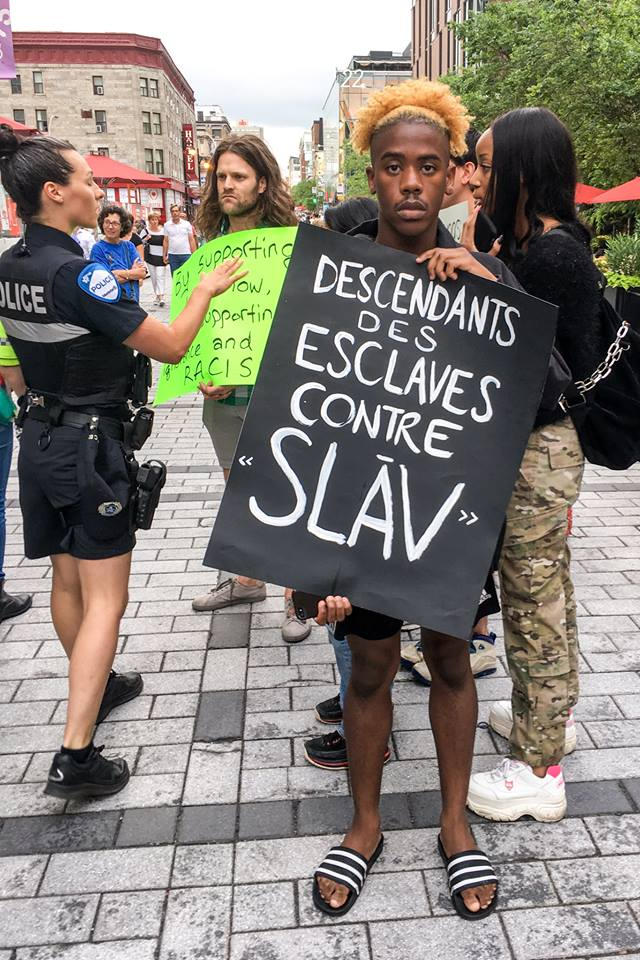
Badly-conceived production, but no malice involved
I think Robert Lepage is a brilliant and creative director who has produced beautiful work. His production of Coriolanus at this year's Stratford Festival is getting rave reviews. I think Betty Bonifassi has a gorgeous voice and her interest in spiritual songs is sincere and long-standing. No one spends the better part of two decades researching and performing something if they are not personally compelled and emotionally invested in doing so. Art is art and one responds to stimuli that may not necessarily be part of one’s cultural and ethnic background. Cultural appropriation isn’t about loving and sharing other people’s culture; it’s about dismissing and debasing the culture’s people while fetishizing and removing the culture and the art from its natural origins without any understanding, context, or respect for it. It’s about excluding the very voices you’re purporting to celebrate. When Quebec rapper, Webster, was consulted about the project, he urged the creators to include more people of colour in the cast, yet was ignored. How in the world could you have white people picking cotton when white colonialism was the very reason black slaves had to pick it at all?
Lepage can claim that the production aimed to be “respectful” and “informed” but, as well-intentioned as he and Bonifassi might have been (I’ll give them the benefit of the doubt), how in the world could it be either of those things if the input of the very people whose cultural output it claims to celebrate and embody were excluded and dismissed – even after the latter clearly made their grievances known? Not only are you appropriating their voices, you’re also silencing and ridiculing their dissent.
You can talk to me about a show’s “artistic merit” all you want, but you have to admit the optics were cringe-worthy. Why did it not occur to them to hire black actors to play those roles, when Quebec producers seem to have no problems using blackface, finding black actors to play the stereotypical gang member on TV, or no shortage of black kids to push some St. Jean Baptiste floats full of white women last year? Those were also bad optics. How many do we have to be guilty of before we stop talking, defending indefensible decisions and just listen? What’s so hard with saying, “this was a mistake” and strive to do better?
When McGill law student and activist Marilou Craft twice voiced her concerns in opinion pieces published in Urbania, she was dismissed as an “angry radical” because labeling someone as angry, paranoid or hysterical is the easiest and laziest way to dismiss and disregard their concerns.
I don’t believe that anyone protesting in front of Théâtre du Nouveau Monde resented Bonifassi for singing those songs. They resented the exclusion and marginalization, which people of colour already live daily socially and politically. They resented her tone-deaf response to their concerns and her insistence on “not seeing colour.” Only white people who have never had the colour of their skin negatively affect their lives utter that kind of clueless nonsense. How can say something like that while singing songs that were only birthed into existence by people whose skin colour allowed their white masters to treat them as subhuman? You can’t state that you’re singing these songs out of love and respect for them while disrespecting the very community and history they came from.
“What would America be like if we loved black people as much as we love black culture,” writer Amandla Stenberg once asked. Yes, Quebec isn’t America and yes, our history is not their history, but slavery and discrimination existed here too, and despite our openness, racism is still alive and well, and so this question should be posed here too.
The response to the controversy is worse than the controversy
Are Robert Lepage and Betty Bonifassi racists and white supremacists? Of course not. Were their intentions malicious and motivated by a desire to degrade and insult the black community? There is nothing to suggest that. Did they act irresponsibly and in an utterly tone-deaf, arrogant, and ignorant way by dismissing legitimate concerns and doubling down on criticism instead of taking the opportunity to listen and learn? Absolutely.
As a side note, why are the people who are giving the benefit of the doubt to these two creators as being well-intentioned and well-meaning so quick to vilify and demonize those protesting? Why, too, are their voices not given equal consideration and considered beyond reproach? Why is their intent also not equally seen as altruistic and sincere?
In my opinion, the response to the criticism has been way more disappointing and revealing than the actual show that the controversy stemmed from. We have all acted in ignorant ways at some point in our lives and as Maya Angelou so succinctly and wisely put it, “when we know better, we do better,” but to use your white privilege to circle the wagons, to once again declare that you have been silenced, and to reiterate that your loyalty is only to your art (at a time in history when we are slowly becoming aware of how many men have used that “allegiance” to one’s art as an excuse to be sorry human beings) is no longer an acceptable response. The co-producers' reaction has been so lacklustre and so defensive, it prompted satirical news magazine The Beaverton to write that Producers of SLĀV are canceling the show to concentrate on new revue of songs of oppressed white people entitled FRAGIL. And that's exactly what the reaction has been so far; one indicative of fragile white egos taking legitimate criticism personally, unable to understand that what they consider innocuous may be deeply injuring to others.
Dear freedom (of speech) fighters, stop bemoaning political rectitude and social movements to do and be better as societal regression. Political correctness hasn’t run amok, people aren’t offended by every little thing, no, we’re not living in a world where you can’t create any kind of art that you like, no, it doesn’t set a dangerous precedent, and yes, you can continue to make a complete ass of yourself and even make money while doing it.
Nothing you hold dear has been taken away from you. We’re simply living in a world where marginalized communities are gaining a voice and becoming louder about what affects and insults them. They, like you, are allowed that voice. They, like you, now have the power to make things happen. Brace yourselves, fellow white folks, but because of changing demographics, you may actually be forced to listen to different points of views, and acknowledge that, while different from yours, they are equally valid. To come to the realization that what you consider “common sense” is perhaps nothing more than your own cultural and societal conditioning and that evolution and ethical concerns about equal representation, diversity, and inclusiveness should also be values to consider right alongside artistic freedom is not a pain-free process, but a necessary one.
I know all this might feel a little discombobulating in a society that continues to be very homogenous ethnically, politically, racially, and yes, even religiously, despite Montreal pockets of multiculturalism, but fear not, we’re far from the radical left or people of colour taking over and establishing their own scary "agenda". How do I know that? I live here.
To say that “all cultures and ethnicities suffer the same” when people of colour were subjected to some of the most heinous atrocities perpetuated in human history and while they continue to bear the unfair burden of racial discrimination and police violence today, is to go up to a person who just had their arm severed and point to your paper cut and commiserate on your suffering. Yes, you both might be experiencing pain, but it’s not even on the same plane of suffering and now you just look ignorant and self-absorbed.
As an added note, to claim that you don’t “see colour” and that “all cultures are the same” is blatantly hypocritical and self-serving at a time when this province (and Canada overall) continue to be embroiled in daily immigration debates about “protecting OUR culture” and making sure that people who “share OUR values” are coming in, and while every government institution, municipal body, and police force is severely underrepresented by people of colour. You can’t claim not to see colour when you’re excluding people in a theatre production, but obviously see it when you’re excluding them from government office, municipal service, and citizenship. It’s like some warped version of Schrödinger’s Cat. Which is it?
This current outrage over the supposed loss of artistic freedom and freedom of speech is nothing more than deflection and dismissal. In Quebec, there are added issues that often and unfortunately compound, complicate, and occasionally paralyze the debate. Because of the history of persecution and discrimination that francophones have historically faced in the past, there continues to be a real unwillingness in francophones to see themselves as the victimizers, but only the victims. They cannot possibly be guilty of systemic racism or insensitivity because they, too, have suffered. I saw someone write on a Facebook wall that Quebec was allowed to mount this production about “negro spirituals” because they, too, had been referred to in the past as “les Nègres blancs d'Amérique” (White N*ggers of America). You have entered deep dissonance territory if this is your argument. Just because Pierre Vallières used this striking description to draw attention to the very real exploitation of francophones by the English ruling class at the time, does not mean one can use it to draw any real comparisons between the two - and certainly not as a pass to openly discriminate and exclude others today.
I also saw many attempts to frame this as an English vs. French debate, as if the majority of Quebecers of colour protesting — Marilou Craft, Webster, Weil Prosper, Emilie Nicolas, etc. — aren't French speakers first and foremost, and as if many Francophones didn't also voice their disapproval of SLAV. This was never a French-English disagreement and I refuse to buy into the "two solitudes" excuse employed by some that serves as an easy way to deflect legitimate criticism as convenient anti-French sentiment by anglophones who, some francophones claim, are only looking to make French-speaking Quebecers appear racist. It's simply not true. For the record, Quebec is no more racist than the rest of Canada, but, sadly, that's not saying much.
Bon côté de la fin de Slav: ça laisse du temps à Lepage pour s'occuper de son projet Kanata, qui explore "les rapports entre Blancs et Autochtones avec un accent sur le féminicide autochtone et le système de pensionnats".
— Mathieu Charlebois (@OursMathieu) July 5, 2018
Qu'est-ce qui pourrait mal virer?https://t.co/2y0h4qNf7R
On peut avoir des opinions divergentes et lancer un vrai débat sur la meilleure façon d'accommoder les différentes sensibilités culturelles, Mais après une semaine de débats, je ne peux pas croire qu'on se limite encore à des sophismes du genre: "on peut pu jouer de jazz, wtf?"
— NicolasTittley (@NicolasTittley) July 4, 2018
Try as many people do to dismiss the outrage displayed by members of the black community as unjustified and excessive, that anger is legitimate, understandable and deserving of introspection. One must simply be willing to see it. Robert Lepage issuing a statement, defending his right to absolute artistic freedom and claiming to be “appalled” by people pushing back shows a terrible and disappointing unwillingness to listen to legitimate grievances, an inability to evolve with the changing mores of our time, and a frightening double standard. What's more, a recent announcement that SLAV, despite being cancelled by the Jazz Festival, is scheduled to appear in Drummondville and Saint-Jerome proves that no real lessons were learned by Lepage here.
Quebec missing a golden opportunity to learn and move forward together
I want to live in a place where we recognize each other’s humanity but respect our differences and acknowledge our respective historical baggage. A place that is willing to discuss these major questions, admit mistakes and strive to do better. A place where we give the benefit of the doubt to one another, but also listen to what we’re uncomfortable hearing. Stop discussing the politeness and civility of the protests outside of the theatre and discuss the reasons for them. Remaining in our respective echo chambers may be easier for the ego and more validating, but it’s ultimately counter-productive. We had the opportunity to discuss racial inequality – not just in the cultural sector, but in all facets of life – and the need for representation, to educate and evolve, and instead we have major players using their privileged access to media to bemoan being muzzled. If we are to co-exist and thrive together (and this remains a beautiful place to do so) we need to make sure we’re hearing each other. And that can’t happen if we’re busy deflecting or yelling at one another, constantly suspicious of each other and our motives.
Lack of diversity cannot be solved by having white writers, producers and singers appropriate the voices and experiences of the marginalized. It requires making genuine room for the excluded. It requires active listening.
Imagine what it must feel like to be a young black Quebecer and to have your legitimate concerns be dismissed as “whining” or “mobbing”. And this is not a uniquely Quebec phenomenon. I’ve seen the exact same thing play out time and time again in the rest of Canada. This outlook is the result of white supremacy and systemic racism. And those definitions are not an attack on anyone personally. It doesn’t mean the creators are racist, or that the people who went to see the show are racist or white supremacists, but it's a clear indication that the predominant, de facto point of view in our society remains a white one.
As I write this, the controversy is still raging, and opinion writers and pundits continue to debate the outcome and bemoan the muzzling of artistic freedom. I look at the people who have the luxury of being able to easily and broadly disseminate their thoughts on this controversy. I quickly count the bylines in La Presse, The Montreal Gazette, Le Devoir, Le Journal de Montreal, and The Globe and Mail. Out of 22 pieces on the subject matter, I count 18 white people (19, if you count me), two biracial and two people of colour. Only one biracial journalist (the Gazette’s T’Cha Dunlevy) is a permanent fixture at that paper. The other people of colour are simply guest writers, solicited specifically for this topic. There will be more columns and that number will change, but right now, I’m looking at an overwhelming majority of white people (even the few who supported the protests) who have a permanent and prevalent position to voice (and ultimately shape) public discourse. And that's not even counting influential political leaders like current and former PQ leaders Jean-Francois Lisée and Pierre Karl Péladeau who somehow also felt the need to express their disdain for these protesters and the loss of freedom of speech. In other words, all the people who claim they don’t see “colour” are, in this case, with minor exceptions, and of course coincidentally, all multiple shades of beige.
Quand les intérêts économiques des promoteurs et des propriétaires du Festival de Jazz de Montréal l'emportent sur la liberté d'expression artistique ! Un mot : Grandement déplorable. pic.twitter.com/4hlQgocIHP
— Pierre Karl Péladeau (@PKP_Qc) July 6, 2018
While I didn’t join my voice with the chorus of people demanding the show be shut down, I also don’t feel any discomfort with the fact that the Montreal Jazz Festival decided to pull the plug. The show’s creators were given many opportunities to include black voices and make it more inclusive and they ignored every single one of them. They had the freedom to choose this vision, they had the freedom to be generously funded by the festival and government grants, they had access to massive marketing resources and the freedom to promote the show everywhere.
And protestors had the freedom to protest, point the international spotlight on them and turn it into a financial and branding liability for the festival, therefore forcing its closure.
That’s not censorship. Those are consequences.
Don't miss Toula Drimonis's next column from Montreal. Buy an annual subscription today and save 20% when you use the promo code TOULA.
Isn't it interesting how
Isn't it interesting how often the very folk who insist on THEIR right to freedom of expression consider that right a means to deny it to everyone else. This particular incident is such a textbook case.
Thank you for honesty. Is a
Thank you for honesty. Is a tribal nation in Canada's future? I fear if left to Trudeau for another four year term that is exactly what we're staring at. Post nation may not be all it's cracked up to be. Yes, I too reflect, and miss our democracy.
Bravo Toula Drimonis - I'm
Bravo Toula Drimonis - I'm impressed by the introduction of the concept of "consequences" to this never ending whine from the white majority. It is a crucial and very apt definition. One that has been missing from social, political, scientific and parental discourse!
Wow! You tell em Toula, don
Wow! You tell em Toula, don't hold back! Seriously though, nicely put.
David: My comment was
David: My comment was obviously not clear. I was referring to Robert LePage's consideration that he had the right to stage this production, in this way, and then complained when others disagreed. We are not talking tribalism here. This is just common sense and respect for the people whose lives continue to be marked by their ancestors' lives of slavery.

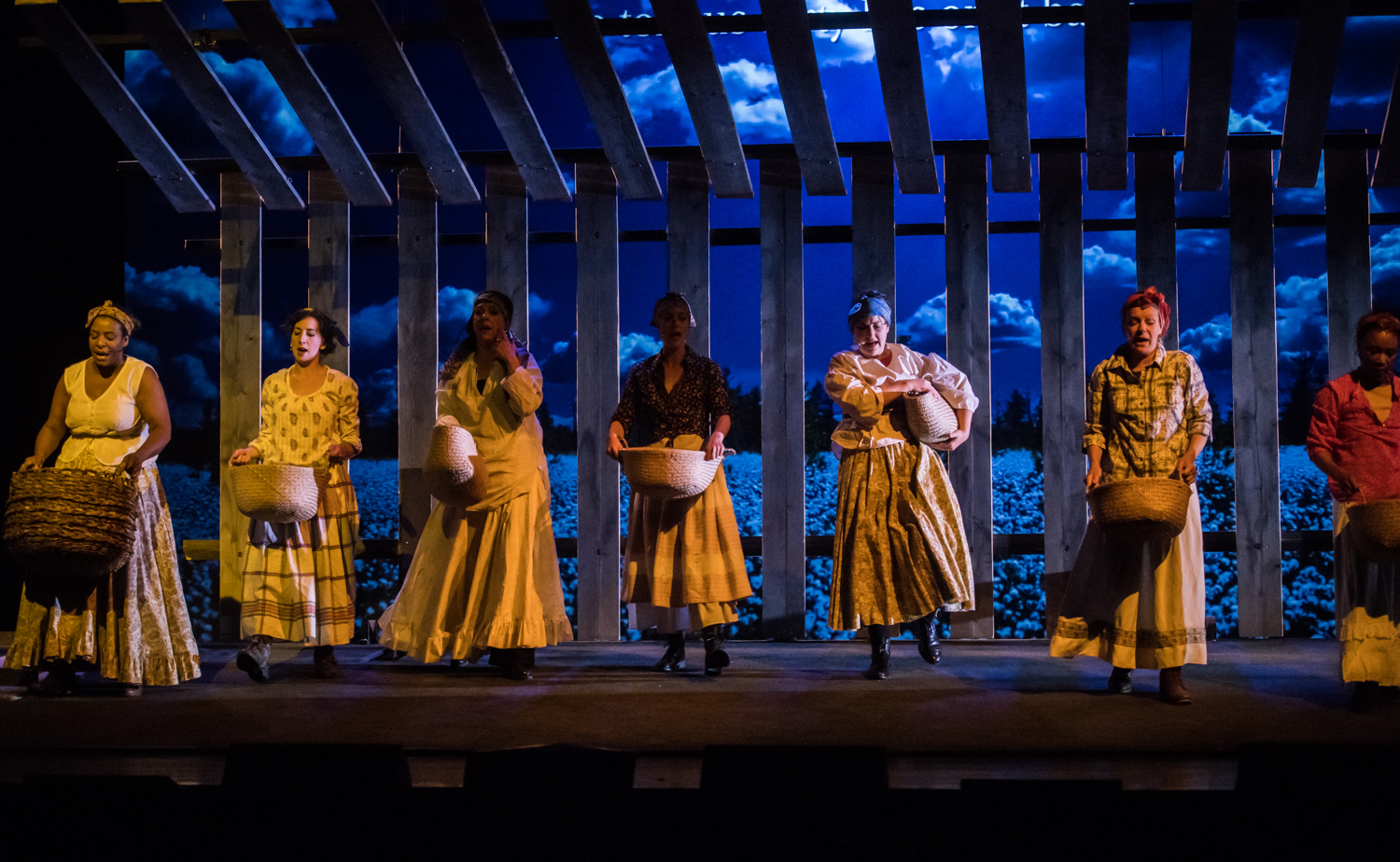

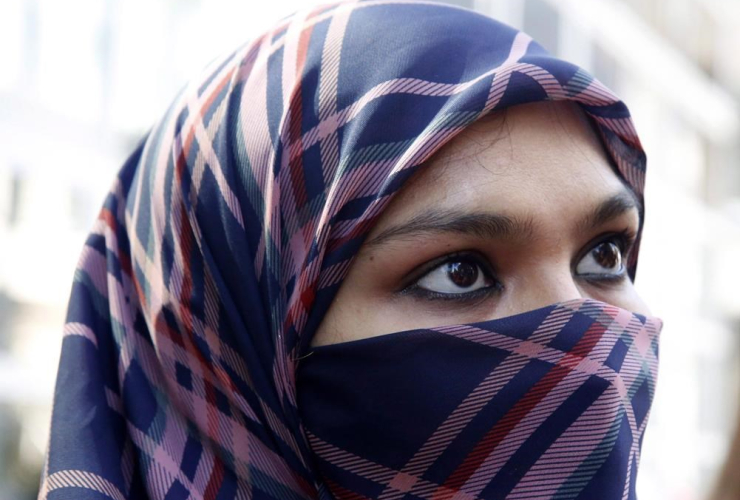
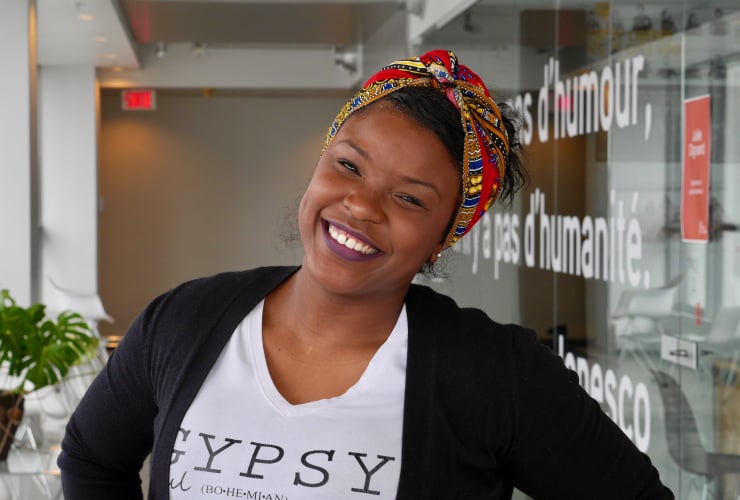
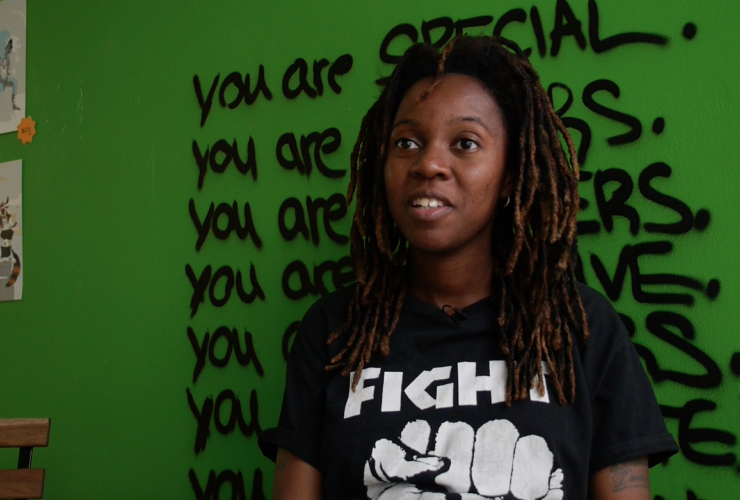
Comments